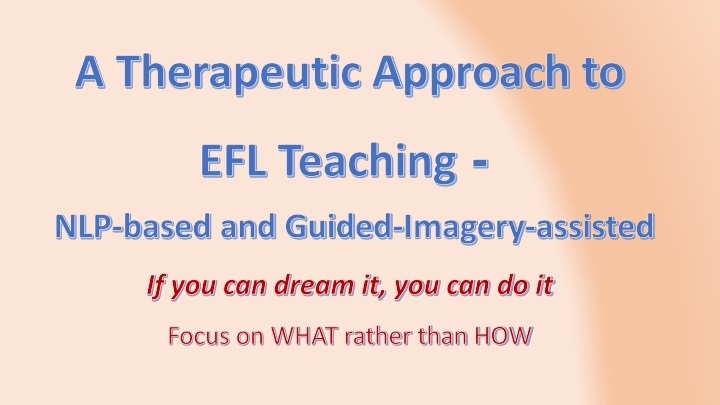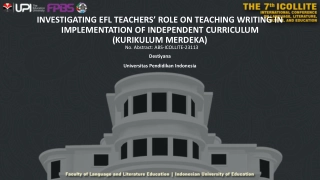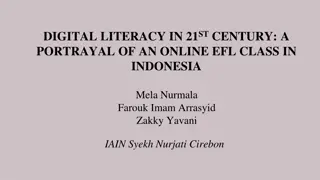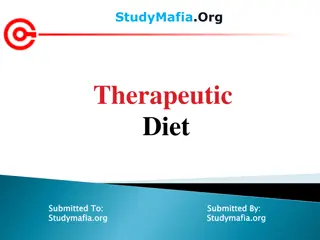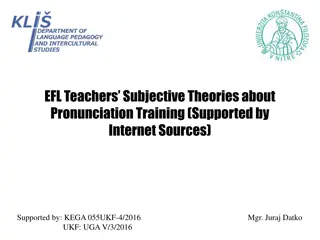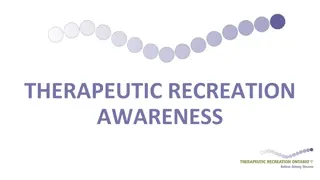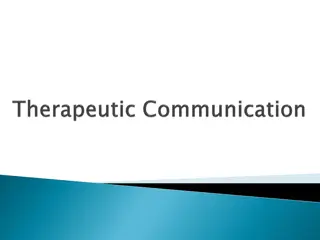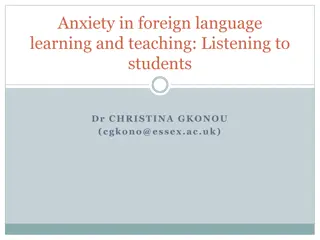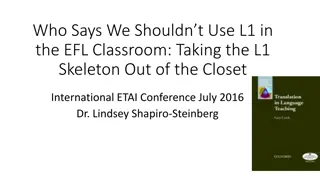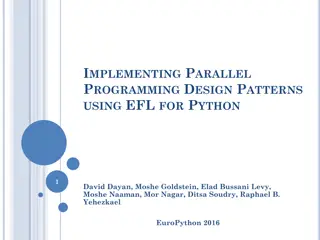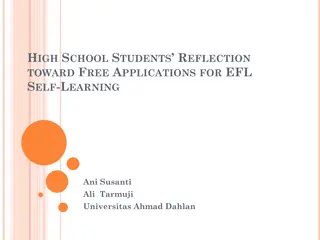A Therapeutic Approach to EFL Teaching
Post-modern challenges in education require a shift towards a therapeutic approach to English as a Foreign Language (EFL) teaching, utilizing Neuro Linguistic Programming (NLP) and Guided Imagery. By focusing on students' behaviors, beliefs, abilities, and emotional balance, this method aims to overcome academic obstacles and enhance learning outcomes. Empirical evidence supports the effectiveness of this approach in promoting self-awareness, relaxation, and positive behaviors among learners. The implications extend to teachers' professional development and specific teaching strategies, emphasizing emotional balance and various language skills. Pre-course relaxation techniques, motivation strategies, and the use of anchors through imagery play a significant role in improving student engagement and achievement.
Download Presentation

Please find below an Image/Link to download the presentation.
The content on the website is provided AS IS for your information and personal use only. It may not be sold, licensed, or shared on other websites without obtaining consent from the author.If you encounter any issues during the download, it is possible that the publisher has removed the file from their server.
You are allowed to download the files provided on this website for personal or commercial use, subject to the condition that they are used lawfully. All files are the property of their respective owners.
The content on the website is provided AS IS for your information and personal use only. It may not be sold, licensed, or shared on other websites without obtaining consent from the author.
E N D
Presentation Transcript
A Therapeutic Approach to EFL Teaching - NLP-based and Guided-Imagery-assisted If you can dream it, you can do it Focus on WHAT rather than HOW
Why Thinking Therapeutic? In post-modern age - instant messaging, multi-tasking , excessive stimuli ,incessant transformation = in-depth learning becomes "mission impossible" in many cases perceived academic failures and disabilities, permanent scars: trauma, anxiety , low self-esteem as a learner. more severe blockage in FL learning - language errors may put one in a position of a fool, since medium of teaching is at the same time subject matter.
Why NLP and Guided Imagery? NLP = Neuro Linguistic Programming= replacing automatic old and irrelevant/overgeneralizing neural pathways/connections with new and successful ones through guided images which are tailored to one s subconscious interpretation of reality. The only meaningful learning can come in an inner state of relaxation and emotional balance leading to individual introspection and self revelation
The Pyramid of Achievements R E S BEHAVIORS U L T S ABILITIES BELIEFS
Empirical Evidence Study conducted by Dov Roitman and Idit Braverman Study group Control group inhibiting beliefs facilitating beliefs There are other chances/ I am ready This course is my last chance/ I will fail focus on shortcomings concentration issues/ pessimism/ underestimated potential/ low self-image Focus on abilities concentration/ time management/ self-awareness facilitating behaviors - relaxation/ expression of potential inhibiting behaviors - stress/ blackout/failure to express potential results - Results - underachievers/ frustrated/ helpless/ lowly-motivated achievers marks reflect potential
Implications and Applications TEACHERS PROFESSIONAL DEVELOPMENT Emotional Balance and Various Language Skills SPECIFIC TEACHING By Avital Halevy
Pre-Course Relaxation Technics Better rapport with students Higher Motivation Pacing and Leading Papier Here also motivates writing Use of anchors through images(to identify and later create emotional balance, e.g. individual paradise, English and specific goals) also motivates listening, speaking and writing (e.g. describe a place)
Diagnostic and Scaling Measures to lower sense of difficulty SCORE EIFRAT Event Interpretation Feeling ReAcTion Symptom Cause Outcome Resource Effect (ecological test) Ongoing scale of 1 to 10 regarding present and wanted levels of RESOURCE
THINK SPECIFIC Specific GOALS, EVENTS, RESOURCES(*) (*) focus on BOTH individual available and wanted resources/abilities to motivate learning efforts
Promoting Facilitating Beliefs Rewriting Inhibiting Beliefs Resulting Conclusion Title to Contradictory Event inhibiting beliefs Resulting feeling/s New feeling/s Hard feeling/s e.g. anchoring name of text one succeeded in
Promoting Facilitating Abilities Chain of Anchors as Stepping Stones for Success Floating River FAMILIAR BANK UNFAMILIAR BANK symptom/ automatic inhibiting response A3 A2 A1 A4 outcome/ new facilitating response Resource + Image + Anchor
Generating Facilitating Behaviors Identifying someone real/ unreal with facilitating abilities/ responses/ resources needed as a source of inspiration Imagining how this person replaces you in an EFL class e.g. posture, looks, responses, gestures, aura Also motivates writing (describe a person)
THE SPECIFIC LEARNER Diagnosing Learning Styles and Matching Strategies I like to write and scribble a lot/ I love to watch at people and observe them highlighting main ideas The Visual Learner flashcards/ notes/ magnets presentations graphic organizers
I can hear myself thinking/ I prefer listening to taped stories to reading stories Reading aloud/ quizlet/ google translate The mnemonics/ short forms/ puns Auditory Learner smart recorders rhyming/ singing
I like to exercise regularly/ I like to cuddle on the couch/ I have good coordination Finger movement (writing in the air) The Tactile/ Mobile Learner spatial learning/ gestures rewriting acting out/ dancing/ jumping
stages of research as AMPMRC skimming as Pass the Parcel game and eye catchers as gifts The Reference dance one step forward for clues , and one step backward in reverse for answer
Relevant NLP Pre-suppositions We all have all the resources we need There is no failure but feedback (for growth) The map is NOT the Territory: every person s map is unique There is always Another Way Behind every action is a positive intention
